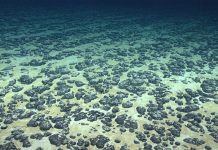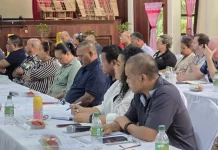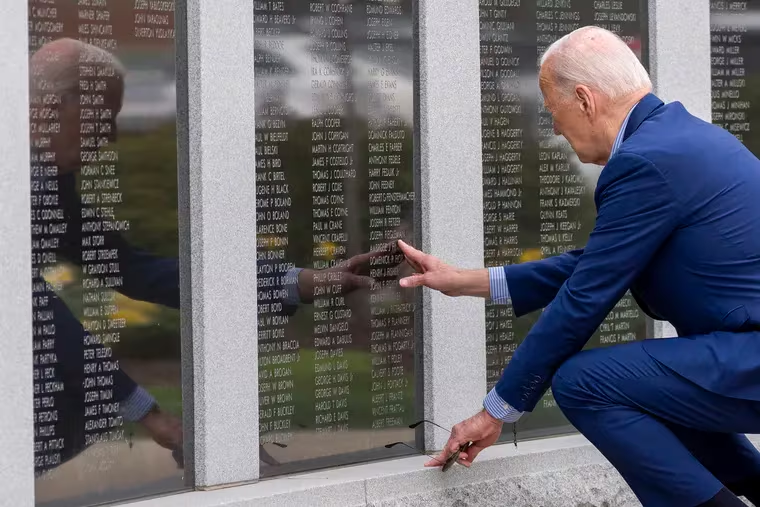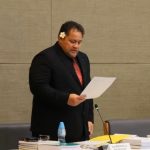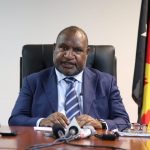Papua New Guinea Foreign Minister Justin Tkachenko said Tuesday that relations with the U.S have hit a “low point” after President Joe Biden claimed his uncle was eaten in the Pacific nation by cannibals during World War II.
Headlines about Biden’s gaffe at a Pennsylvania war memorial last week went viral in Papua New Guinea and were widely mocked on social media.
Prime Minister James Marape in a statement Sunday said the president’s comments may have been a “slip of the tongue, however my country does not deserve to be labeled as such.”
His foreign minister on Tuesday went a step further – calling for the record to be set straight.
“These apparent untrue remarks by the sitting president [are] a low point in our relations,” Tkatchenko said in a statement, adding the comments were not supported by official documents.
Tkatchenko said records showed that Biden’s uncle was on a flight from Momote to Lae, over the Bismarck Sea, but never made it to his destination.
“PNG hopes that the White House can correct this remark which has the potential to hurt our cordial relations,” he said.
Biden twice last week suggested without evidence his uncle, Ambrose Finnegan, was eaten by cannibals after being shot down during a reconnaissance flight in a single-engine U.S. Air Force plane over Papua New Guinea.
“He got shot down in New Guinea, and they never found the body because there used to be — there were a lot of cannibals, for real, in that part of New Guinea,” Biden said on 17 April.
U.S defence records contradict Biden’s story and state Finnegan was a passenger in a plane that crashed into the Pacific Ocean off the north coast of Papua New Guinea.
The diplomatic incident began to unfold as Chinese Foreign Minister Wang Yi visited Papua New Guinea at the weekend and signed several agreements between the two countries, including a feasibility study for a free-trade deal.
China and the U.S are currently engaged in a regional battle for influence and Papua New Guinea, the most populous Pacific island country, is one of their main theaters.
The U.S embassy in Port Moresby issued a press release Tuesday without directly addressing the “cannibal” remarks.
“President Biden highlighted his uncle’s story as he made the case for honoring our sacred commitment to equip those we send to war,” the embassy said.
“The U.S respects the people and culture of Papua New Guinea and remains committed to furthering respectful relations.”
Cannibalism in Papua New Guinea was rare by the 1960s after being banned by Australia – the colonial power – the previous decade. It was largely a ritualistic practice.
The Pacific island country was invaded by Japan in 1942 and some of its soldiers committed acts of cannibalism on prisoners of war after their supply lines were cut off, according to Japanese army documents seized by Australian troops and analyzed by academics.
The Tokyo War Crimes trials, which took place between May 1946 to November 1948, found there was not enough evidence to charge any Japanese for cannibalism, but Australian military trials in New Guinea after the war convicted soldiers for the crime and issued death penalties.
This week Australian Prime Minister Anthony Albanese is in Papua New Guinea and will walk with Marape along sections of the Kokoda Track, an infamous battlefield where more than 10,000 U.S, Australian and Japanese soldiers died, as well as an unknown number of Papuans.
At a state dinner in Port Moresby Monday, Albanese said his counterpart had assured him Australia remains Papua New Guinea’s security partner of choice
“This is a relationship that has never been closer, as symbolized by the fact that we’ll be walking side-by-side down the Kokoda Track,” Albanese said.
“We want the Pacific family to look after security in this region.”
The highly symbolic visit to the mythologized campaign site by Albanese comes ahead of Anzac Day commemorations on Thursday, which remember Australians and New Zealanders that served and died during wars.




